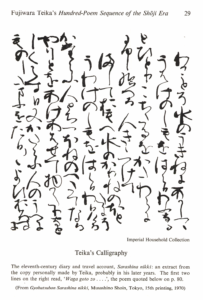This week: the career and legacy of the most influential Japanese poet you’ve probably never heard of, Fujiwara no Teika. Teika’s views on poetry and literature have shaped how we read those genres down to the present day, so how did he develop such authority in the field?
Sources
Atkins, Paul S. Teika: The Life and Works of a Medieval Japanese Poet.
Commons, Anne. Hitomaru: Poet as God.
Brower, Robert H. “Fujiwara Teika’s Maigestusho”. Monumenta Nipponica 40, No 4 (Winter, 1985).
Atkins, Paul S. “Meigetsuki, the Diary of Fujiwara no Teika: Karoku 2.9 (1229)”. Journal of the American Oriental Society 130, No 2 (April-June, 2010).
Bialock, David T. “Voice, Text, and the Question of Poetic Borrowing in Late Classical Japanese Poetry.” Harvard Journal of Asiatic Studies 54, No 1 (June, 1994)
Images

Well, I’m hoping that since each subsequent episode has had brief mentions in previous ones that this means you’ll dive into more about why Hyakunin Isshu is so influential and how there’s a whole sport surrounding it.